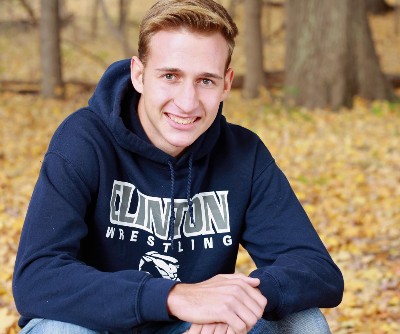
When Alisha Maly, her husband, and their seven children moved from a big district to a smaller, rural district, Alisha was concerned about whether their kids would have the same academic opportunities. It’s true that some courses don’t have the students needed to hold a class. Yet rural schools, like the Clinton Community School District, are able to provide students the classes they need through the Early College Credit Program (ECCP), which allows high school students to take college classes for high school and/or college credit while reimbursing the school for the tuition.

Alisha had a front row seat. Her eldest son, Ryland, saw a student a year ahead of him, spending much of her high school days at a local college using ECCP. He was inspired that she could pursue college classes and earn college credit during high school. Alisha worked with her son to “figure [ECCP] out.”
In his freshman and sophomore years, Ryland took several of the CTE courses that Clinton offered. “His junior and then senior years, he took almost all ECCP classes,” she says. “He was able to take a lot of business courses and prerequisites.”
Ryland, who is currently studying as an undergraduate at UW-Whitewater, is interested in day trading at the moment, according to Alisha. “He’ll actually graduate from UW-Whitewater in 2-1/2 years with his degree.”
“Initially, I wasn't planning on him graduating early. I actually thought this would give him time to change his direction,” says Alisha. “I still expect him to make about five more turns in life between now and when he turns 50.”
What Parents Should Know About ECCP
Motivation: “ECCP doesn't have to be for the smartest kid in the world. It can just be for any kid who's motivated,” says Alisha. “But it has to be motivated by your student because it's a college class … So if you don't have a kid who you know is dependable to keep up on their own, then it would not be as achievable.”
College credit: “The advantage of ECCP even over AP classes [is that] you're guaranteed credit. I mean, you get a real grade … on your transcript,” says Alisha. And as long as Clinton did not offer comparable classes, Ryland was free to take college courses and earn college credit through ECCP.
Savings: “Ryland didn’t get very many scholarships,” she says. But by earning the credit, “it’ll save them more than $20,000.”
Confidence: “I think doing college young actually has boosted [her children’s] confidence.”
Challenging: ECCP students must put in their spring course requests by October 15, but colleges often have not released their spring schedules yet. When they do come out, priority goes to college students, and then ECCP students can get in if there’s room. “It can be a hard program to work with,” says Alisha.
Still, two of her other kids have used ECCP—one a budding nurse, the other a hopeful dentist. But she said she’s not sure if her other kids will be interested. Her younger children are still coming home, saying, “I'm going to be in the NBA.” And she says, “Alright, kiddo, you can go ahead and be in the NBA.” She’s not worried. She knows that if her children decide to pursue a dream other than the NBA, they can explore their options through ECCP.
